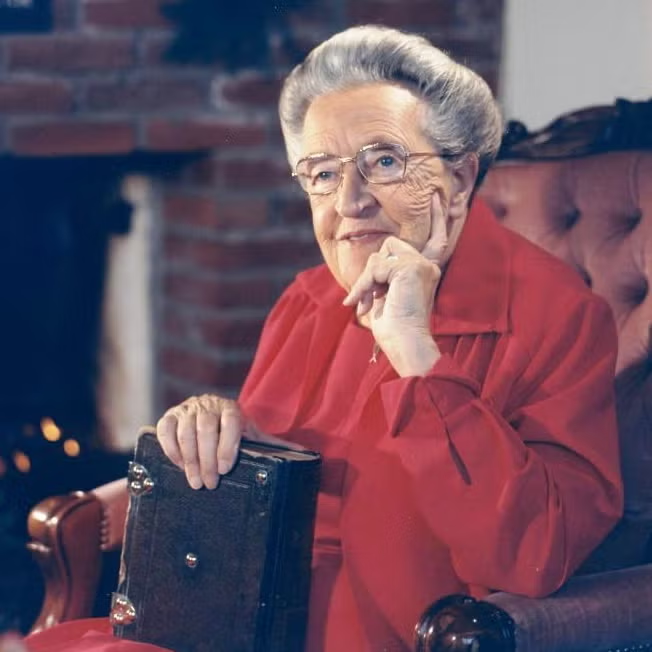
Latest News: ‘The Hiding Place’ Movie (2023)
This month, audiences will have the opportunity to experience The Hiding Place, a film adaptation of Corrie ten Boom’s poignant autobiographical book. The story chronicles her family’s courageous efforts to shelter Jews during the Holocaust. Starring Nan Gurley as Corrie ten Boom, along with Carrie Tillis and John Schuck, the movie premieres in the United States on August 3 and 5, followed by an international release on August 16.
Who Was Corrie ten Boom?
Cornelia “Corrie” ten Boom was a Dutch watchmaker renowned for her humanitarian efforts during World War II, where she and her family harbored hundreds of Jews to protect them from Nazi persecution. It is estimated that their courageous actions saved nearly 800 lives. Ultimately, the ten Boom family was betrayed by a fellow Dutch citizen, leading to their arrest. Corrie ten Boom survived her imprisonment and later shared her harrowing experiences in her 1971 memoir, The Hiding Place. A member of a devoutly religious family, she also established a worldwide ministry and traveled extensively as a public speaker. Corrie ten Boom passed away on her 91st birthday, April 15, 1983.
Early Life
Born on April 15, 1892, in Haarlem, Netherlands, Cornelia Arnolda Johanna ten Boom, affectionately known as “Corrie,” was the youngest of four siblings. Her father, Casper ten Boom, was a jeweler and watchmaker. The ten Boom family resided in the Beje house in Haarlem, located above Casper’s watch shop. As devout Calvinists within the Dutch Reformed Church, the ten Booms were inspired by their faith to serve their community, providing shelter, food, and financial assistance to those in need. They held a profound respect for the Jewish community, viewing them as “God’s ancient people.”
Watchmaking Career
Following her mother’s death and a disheartening romantic relationship, Corrie pursued a career in watchmaking. In 1922, she became the first licensed female watchmaker in Holland. In addition to her work in her father’s shop, she established a youth club for teenage girls, which provided religious instruction and classes in the performing arts, sewing, and handicrafts.
Efforts During World War II
The onset of World War II in May 1940, marked by the German Blitzkrieg, significantly altered the lives of the ten Boom family. The Beje house transformed into a refuge for Jews, students, and intellectuals, with the façade of the watch shop serving as a perfect cover. A secret room was constructed in Corrie’s bedroom behind a false wall, capable of accommodating up to six individuals. A makeshift ventilation system ensured a supply of air for the occupants. An alert system, comprising a buzzer, signaled danger, giving refugees just over a minute to hide.
The ten Boom family became active members of the Dutch resistance, risking their lives to protect those targeted by the Gestapo. Corrie emerged as a leader in the “Beje” movement, overseeing a network of safe houses across the country, which ultimately saved an estimated 800 Jewish lives. On February 28, 1944, a Dutch informant alerted the Nazis to the ten Booms’ activities, leading to their arrest. Despite a thorough search of the premises, the Nazis failed to uncover the six Jews hidden in the secret room, who remained concealed for nearly three days before being rescued by the Dutch underground.
Following their arrest, all ten Boom family members were incarcerated, including Corrie’s 84-year-old father, who died shortly after in Scheveningen prison. Corrie and her sister Betsie were sent to Ravensbrück concentration camp, where Betsie perished on December 16, 1944. Twelve days later, Corrie was released due to a clerical error.
Work and Honors After the War
Upon her return to the Netherlands after the war, Corrie ten Boom established a rehabilitation center for concentration camp survivors and extended her compassion to those who had collaborated with the Germans during the occupation. In 1946, she began a global ministry that would take her to over 60 countries.
Throughout her life, ten Boom received numerous accolades, including being knighted by the Queen of the Netherlands. In December 1967, she was honored by the Yad Vashem Remembrance Authority as one of the Righteous Among the Nations, a distinction awarded to non-Jewish individuals who risked their lives to save Jews during the Holocaust. Notable recipients of this honor include Varian Fry and Oskar Schindler, whose story inspired the acclaimed film Schindler’s List.
‘The Hiding Place’ and Movie Adaptations
In 1971, Corrie ten Boom published her best-selling memoir, The Hiding Place, which was adapted into a film in 1975, starring Jeannette Clift as Corrie and Julie Harris as Betsie. This adaptation, produced by renowned evangelist Billy Graham, brought her story to a broader audience. The latest film adaptation is currently showing in select theaters before its international release in August 2023, featuring Nan Gurley as Corrie and Carrie Tillis as Betsie. This updated version was filmed in Nashville, Tennessee, and commemorates the legacy of Clift’s original portrayal.
In addition to The Hiding Place, ten Boom authored another memoir titled In My Father’s House: The Years Before the Hiding Place and a series of religious texts.
Final Years and Death
In 1977, at the age of 85, Corrie ten Boom relocated to Placentia, California. The following year, she suffered multiple strokes that left her paralyzed and unable to speak. Corrie ten Boom passed away on her 91st birthday, April 15, 1983. Her death on this significant date resonates with the Jewish tradition that only particularly blessed individuals are granted the privilege of passing away on their birth date.
